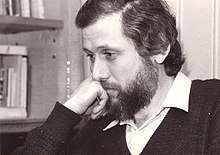Valeri Brainin
Valeri Brainin (aka Willi Brainin and Brainin-Passek, Russian: Валерий Борисович Брайнин (Valeri Borissovich Brainin) [vɐˈlɨrʲɪj bɐˈrʲisəvʲɪtɕ ˈbrajnʲɪn] (![]()
![]()
![]()

Born January 27, 1948 in Nizhni Tagil, Russia, in the family of Austrian poet and translator, political émigré Boris Brainin (Sepp Österreicher), who belonged to the well-known Viennese Brainin family (his relatives are Hebrew publicist, biographer and public figure Reuben Brainin, Austrian/British violinist Norbert Brainin and others).
He lives at the moment both in Hanover, Germany, and in Moscow, Russia.
Positions
President (from 2004) of the Russian Federation Society for Music Education (RussSME) – National Affiliate of the International Society for Music Education (ISME), a member of UNESCO.[1] Head of the Laboratory of New Technologies in Music Education, Moscow State Pedagogical University. Art Director of Classica Nova International Music Competition. [2] Art Director of the net of Brainin Music Schools (Brainin-Musikschulen), Germany. [3] He has directed seminars/master courses at conservatoires and universities in Austria, Colombia, Germany, Italy, Russia, USA, etc. In addition he offered weekly music talks on Radio Liberty from Munich and Prague, and has literary, critical and scientific musical publications in Russian, German, English, and Italian.
Music activities
Brainin is a full Member of the International Teacher's Training Academy of Science (Moscow),[4] and of other scientific/pedagogical societies. He studied mathematics, linguistics, musical pedagogics, music theory and composition. He has had works performed in the Bolshoi Theatre, Moscow, and taught at Moscow's Gnessin Music School for specially gifted children. The Brainin Teaching Method for ‘development of musical intelligence in children’[5][6] became a standard part of the curriculum. He is also a noted piano teacher for children. Among his former students there are some prize-winners of national and international competitions. [7][8][9][10][11][12] Brainin is a researcher in microtonal music.[13]
Literary activities
Russian poet (also known as Valeri (Willi) Brainin-Passek),[14][15][16][17] a pupil of Arseny Tarkovsky, a member (1985–1990) of Moscow Club „Poezia“ (ru: Клуб «Поэзия») together with Yuri Arabov, Jewgenij Bunimovitch, Mikhail Epstein, Alexandr Eremenko, Sergey Gandlevsky, Nina Iskrenko, Timur Kibirov, Alexei Parshchikov, Dmitri Prigov, Lev Rubinstein, a. o.
Most essential poetry publications:
Russian:
literary magazines "Znamya" (Moscow), "Novy Mir" (Moscow), "Arion" (Moscow), "Ogoniok" (Moscow), "Grani" (Frankfurt-am-Main), "Dvadtsat dva" (Jerusalem), "Kreshchatik" (Kiev), anthologies "Verses of the Century" (Moscow, compiled by Yevgeny Yevtushenko) and "Verses of the Century-2" (Moscow, compiled by Eugen V. Witkowsky).
- Брайнин-Пассек, В. К нежной варварской речи. Стихотворения. Составитель Михаил Безродный. Предисловие Юрия Арабова. — СПб.: Алетейя, 2009. — 94 c. — (Серия «Русское зарубежье. Коллекция поэзии и прозы»). ISBN 978-5-91419-277-5
English:
literary magazine "Partisan Review" (Boston).[18]
Well-known relatives
- Elisabeth Brainin (1949), Austrian psychoanalyst and scientific writer
- Fritz Brainin (1913–1992), Austrian/American poet
- Harald Brainin (1923–2006), Austrian poet and writer
- Max Brainin (1909–2002), Austrian/American commercial graphic artist and violinist
- Norbert Brainin (1923–2005), Austrian/British violinist, the founder of Amadeus Quartet
- Reuben Brainin (1862–1939), Hebrew publicist, biographer and public figure
Sources
- English, Russian: http://russ.isme.org Archived 2008-06-04 at the Wayback Machine
- German: Guinness Book Certificate
- English, German, Italian, Spanish, Polish, Russian: Brainin Music School
- Russian: http://www.manpo.ru
- Brainin Method on YouTube
- V.Brainin. Development of "predictive perception" of music in children. // In: A.R.Addessi & S.Young (Eds). MERYC2009. Proceedings of the European Network of Music Educators and Researches of Young Children, Bologna (Italy), 22nd-25th July 2009, pp.135-142. Bologna: Bolonia University Press, 2009, ISBN 978-88-7395-472-9 (available in Internet)
- "Archived copy". Archived from the original on 19 February 2009. Retrieved 12 November 2008.CS1 maint: archived copy as title (link)
- [Classica Nova] [Prize-winners]
- Welcome to the website of Yulia Musayelyan Archived 2008-08-28 at the Wayback Machine
- [Classica Nova] [Prize-winners]
- [Classica Nova] [Prize-winners]
- "Anastasia Avdalova". brainin.org. Retrieved 24 September 2019.
- Valeri Brainin. Employment of Multicultural and Interdisciplinary Ideas in Ear Training ("Microchromatic" Pitch. "Coloured" Pitch). // Proceedings: International Society for Music Education 28th World Conference, Bologna, 2008, ISBN 978-0-9804560-2-8 (available in Internet)
- Russian: Sergey Chuprinin. German writers Archived 2011-08-13 at the Wayback Machine
- Чупринин С. Русская литература сегодня. Зарубежье. – М., Время, 2008, ISBN 978-5-9691-0292-7
- В.В.Огрызко. Русские писатели. Современная эпоха. – М., Литературная Россия, 2004
- E.Tichomirova. Russische zeitgenössische Schriftsteller in Deutschland. Ein Nachschlagewerk. – München: Verlag Otto Sagner, 1998
- The American Bibliography of Slavic and East European Studies 1994 by Maria Gorecki Nowak. – Publisher: M. E. Sharpe, 1997. ISBN 1-56324-751-8